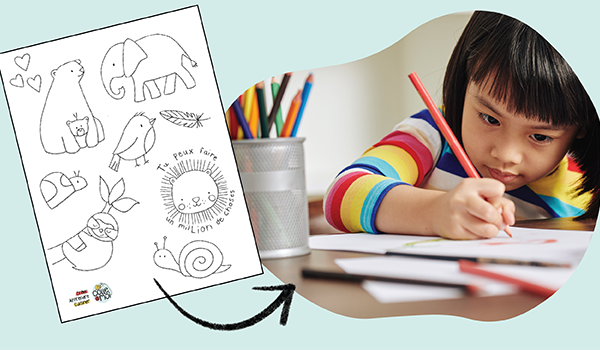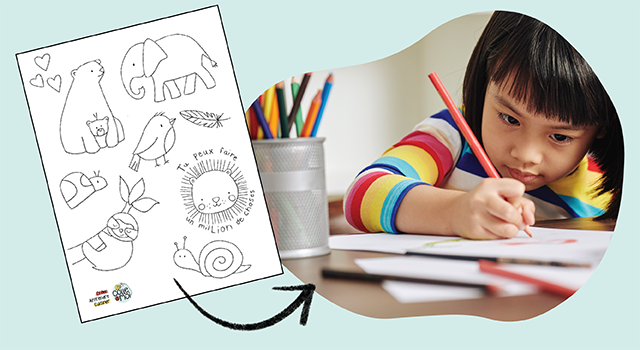Homework and lessons, how to do better?
Whether you agree or disagree homework and lessons in elementary school, there are ways to make this time more enjoyable. As much for you as for your child. But before jumping into the heart of the matter, here is a little reminder. Homework is the made to deepen and consolidate what they’ve already learned. As for the lessons, it prepares your child for a future class. That being said, Colle à moi wants to help you out with some tips and tricks on how to do homework and lessons without being a source of conflict.
A philosophy to adopt to help with homework
According to Aider son enfant, to ensure that homework and lesson in elementary school does not become a problem, you should adopt these 4 principles:
Encourage independence by, among other things, supervising your child’s work from a distance. Don’t read over his shoulder, instead be in the same room so you’re still available to listen. To help them take responsibility, you can ask questions at the end of their homework and lessons. Ex. : What did you find easy? Do you have any questions for your teacher?
Value school by showing them concretely how what they have learned will help them throughout their lives. For example, when you calculate the price of food at the grocery store, you are doing math. You can also take an interest in what he is doing at school by asking him questions when he gets home. For example: What material did you like at school today?
Encourage their effort
At school your child can learn that success is tied to time and effort. One way to encourage effort is to make sure he or she is working on a proper routine and using their schedule well. In addition, by making them proud of their achievements and progress, you encourage their efforts. For example, if he didn’t get a high grade in a subject, praise him for his efforts so that he understands that improvement is as important as the final grade.
Encourage reading
Since all school subjects involve reading, the more your child reads, the greater his or her chances of success. To make reading a hobby, you can take your child to the library, talk about your favorite books, and make sure you leave interesting books around. You can also add a fun twist by having her read to the family in a play-like setting.
How much time should be allocated for homework?
To avoid doing homework and lessons a chore in elementary school, a child in grade 1 or 2 should spend no more than 10 minutes a day, 4 times a week. In grades 3 and 4, the maximum time allowed increases to 15 minutes. And by the end of elementary school, this homework time should not exceed 30 minutes. But how do you establish a good atmosphere?
Establish a pleasant atmosphere
Motivation to do homework and lessons in elementary school is not necessarily natural. Think back to when you were in elementary school! In order to make this time enjoyable, you have to get involved. Start by giving him a snack he likes and set a time limit for homework. Then put on a smile. If this period seems boring for you, can you imagine for your child. You can also let them choose where to do their homework and change from time to time. In the kitchen, you could use magnets from the fridge to count or a white board. We suggest telling the rest of the family that you don’t want to be disturbed.
To make it more fun, you can let your child ask you questions. Playing teacher is so much fun. Why not make up a song with the concepts to be learned? Or write the vocabulary words on a piece of paper and tape them to the wall. There are so many ways to make it enjoyable, and it’s important that your child is well equipped. To do homework and lessons easier in elementary school, we have created a small list of materials to always have on hand.
Parent’s role during homework
When you decide that homework and lessons in elementary school are a priority, you need to discuss it with your child and involve him or her in planning time slots. Remember that you also share responsibility for homework with the teacher and your child. Don’t put too much pressure on yourself, you can’t know everything. According to Naitre et grandir, your role is mainly to guide, making sure they have their material, a quiet place and access to you if they has questions.
You can help them understand what he must do while respecting their rhythm. You are there to help develop their autonomy. But that doesn’t stop you from finding original and fun ways to learn your multiplication tables or vocabulary. For example, if your child loves trains, you could create a story where they must calculate the number of trains and write their names.
Of course, your role is also to encourage them by highlighting their successes and progress. For example, you might encourage your child to make a jump with each correct answer, until they have crossed the entire room. Congratulate them! They will be proud of themselves, and it will make learning easier. Let them know that you enjoy helping them with their elementary school homework and lessons and that this is a special time for you. Besides, listen carefully, it’s often a good time for confidences.
Nothing is perfect. Even though you are well-intentioned and equipped, your child may still throw a fit. When this happens, Alloprof Parents suggests that you let them name their emotion, take a break for a few minutes and try to break the work into smaller steps. You can also offer to go play and pick up homework later. The important thing is to get it done. And that you want to do it again tomorrow. With a smile of course!
Other articles that might interest you:






